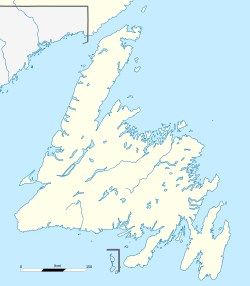Musgravetown
Musgravetown | |
|---|---|
Town | |
| Coordinates: 48°24′51″N 53°53′32″W / 48.41417°N 53.89222°W | |
| Country | Canada |
| Province | Newfoundland and Labrador |
| Settled | 1863 |
| Population (2016) | |
• Total | 564 |
| Time zone | UTC−03:30 (NST) |
| • Summer (DST) | UTC−02:30 (NDT) |
| Area code | 709 |
| Highways | |
Musgravetown (pop: 564 in 2016) an incorporated municipality in the sheltered southwest corner of Bonavista Bay on the northeast coast of the island of Newfoundland of the Canadian province of Newfoundland and Labrador.
History
Musgravetown which is largely an agricultural community, dates back to the mid-19th century when the fertile soil and abundant timber attracted settlers from more easterly communities on the Bonavista Peninsula.
To this point Musgravetown had only seen seasonal occupants, and was known vaguely as the western shore of Goose Bay, Bonavista Bay. Yet as the 19th century progressed, the community gained a more permanent status, and the residents adopted its current name in honour of Sir Anthony Musgrave who served as governor of Newfoundland from 1864-1869.
The first permanent inhabitant of Musgravetown is locally accepted to be one Joseph Greening of Bonavista, who along with his brother Thomas, his son Frederick and other members of his family settled in lower Musgravetown in 1863. He constructed a ‘long house’ of logs after the tradition of Newfoundlanders of the period; and maintained his family through logging, fishing and farming. To this day descendants of Joseph Greening continue to live in the gardens he cleared and cultivated almost 150 years ago.
By 1869 Musgravetown was reported to be a ‘thriving community’; and could boast a population of 352. With some 140 acres (570,000 m²) of farmland under cultivation, its impressive production of livestock and produce made Musgravetown the most important farming community on the Bonavista Peninsula outside of Bonavista itself.
By 1871 families names of Brown, Dominey, Greening, Wiseman, Holloway, Howse, Little, Martin, Matthews, Oldford, Perry, Reader, Saint, and Way were found in the community.


